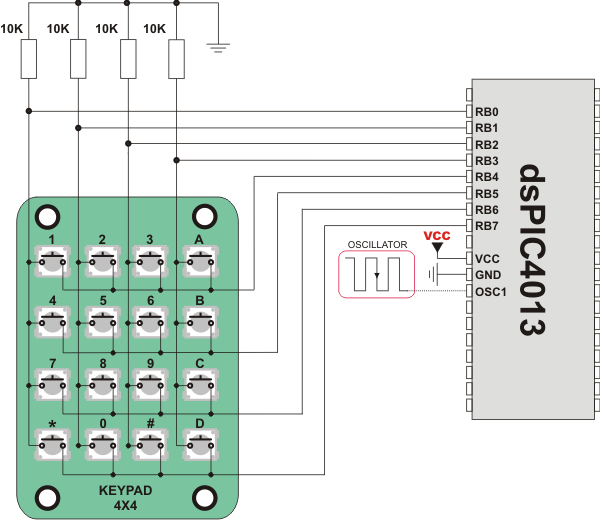Keypad Library
The mikroC PRO for dsPIC30/33 and PIC24 provides a library for working with 4x4 keypad. The library routines can also be used with 4x1, 4x2, or 4x3 keypad. For connections explanation see schematic at the bottom of this page.
External dependencies of Keypad Library
| The following variable must be defined in all projects using Keypad Library: | Description : | Example : |
|---|---|---|
extern sfr unsigned int keypadPort; |
Keypad Port. | unsigned keypadPort at PORTB; |
Library Routines
Keypad_Init
| Prototype |
void Keypad_Init(); |
|---|---|
| Description |
Initializes given port for working with keypad. |
| Parameters |
None. |
| Returns |
Nothing. |
| Requires |
External dependencies of the library from the top of the page must be defined before using this function. |
| Example |
// Keypad module connections char unsigned at PORTB; // End of keypad module connections ... Keypad_Init(); |
| Notes |
The Keypad library uses lower byte (bits <7..0>) of |
Keypad_Key_Press
| Prototype |
unsigned Keypad_Key_Press(); |
|---|---|
| Description |
Reads the key from keypad when key gets pressed. |
| Parameters |
None. |
| Returns |
The code of a pressed key (1..16). If no key is pressed, returns 0. |
| Requires |
Port needs to be initialized for working with the Keypad library, see Keypad_Init. |
| Example |
unsigned kp; ... kp = Keypad_Key_Press(); |
| Notes |
None. |
Keypad_Key_Click
| Prototype |
unsigned Keypad_Key_Click(); |
|---|---|
| Description |
Call to |
| Parameters |
None. |
| Returns |
The code of a clicked key (1..16). If no key is clicked, returns 0. |
| Requires |
Port needs to be initialized for working with the Keypad library, see Keypad_Init. |
| Example |
kp = Keypad_Key_Click(); |
| Notes |
None. |
Library Example
The following code can be used for testing the keypad. It is written for keypad_4x3 or _4x4. The code returned by the keypad functions (1..16) is transformed into ASCII codes [0..9,A..F], and then sent via UART1.
unsigned short kp, oldstate = 0;
char txt[6];
// Keypad module connections
unsigned keypadPort at PORTB;
unsigned keypadPort_Direction at TRISB;
// End Keypad module connections
void main() {
ADPCFG = 0xFFFF;
UART1_Init(9600);
Delay_ms(100);
Keypad_Init(); // Initialize Keypad
do {
kp = 0; // Reset key code variable
// Wait for key to be pressed and released
do
// kp = Keypad_Key_Press(); // Store key code in kp variable
kp = Keypad_Key_Click(); // Store key code in kp variable
while (!kp);
// Prepare value for output, transform key to it's ASCII value
switch (kp) {
//case 10: kp = 42; break; // '*' // Uncomment this block for keypad4x3
//case 11: kp = 48; break; // '0'
//case 12: kp = 35; break; // '#'
//default: kp += 48;
case 1: kp = 49; break; // 1 // Uncomment this block for keypad4x4
case 2: kp = 50; break; // 2
case 3: kp = 51; break; // 3
case 4: kp = 65; break; // A
case 5: kp = 52; break; // 4
case 6: kp = 53; break; // 5
case 7: kp = 54; break; // 6
case 8: kp = 66; break; // B
case 9: kp = 55; break; // 7
case 10: kp = 56; break; // 8
case 11: kp = 57; break; // 9
case 12: kp = 67; break; // C
case 13: kp = 42; break; // *
case 14: kp = 48; break; // 0
case 15: kp = 35; break; // #
case 16: kp = 68; break; // D
}
UART1_Write(kp); // Send value of pressed button to UART
} while (1);
}
HW Connection

4x4 Keypad connection scheme
What do you think about this topic ? Send us feedback!




